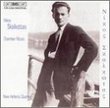| All Artists: Josef Suk, Jiri Belohlavek, Czech Philharmonic Orchestra Title: Asrael Symphony Members Wishing: 0 Total Copies: 0 Label: Chandos Release Date: 10/28/1992 Genre: Classical Style: Symphonies Number of Discs: 1 SwapaCD Credits: 1 UPC: 095115904220 |
Search - Josef Suk, Jiri Belohlavek, Czech Philharmonic Orchestra :: Asrael Symphony
 | Josef Suk, Jiri Belohlavek, Czech Philharmonic Orchestra Asrael Symphony Genre: Classical
"Asrael" is the Muslim angel of death, and the composer wrote this work to exorcise his grief over the loss of his beloved wife and father-in-law, both of home die within a year of each other. That father-in-law, incidenta... more » |
CD DetailsSynopsis
Amazon.com "Asrael" is the Muslim angel of death, and the composer wrote this work to exorcise his grief over the loss of his beloved wife and father-in-law, both of home die within a year of each other. That father-in-law, incidentally, was none other than Dvo?ák. Suk was one of the most talented of his students, and this massive, hyper-Romantic five-movement symphony moves from anguish and despair to a tranquil acceptance of life's tragic events. The piece has received a lot of attention recently, and rightly so. It's a magnificently confident essay that anyone who loves, say, Mahler or Strauss, will find just about irresistible. This performance is not as heavy as some, but it wears very well, and sounds great. --David Hurwitz Similar CDs
|
CD ReviewsThe symphony of anguish, anger, passion, reflections,&power. 05/16/1999 (5 out of 5 stars) "Josef Suk (1874-1935) wrote this powerful, anguish, contemplative Asrael Symphony by 1907, with the dedications to the noble memory of both Antonin Dvorak & Otilka Dvorak (daughter of Dvorak & wife of Suk). The original plan was a three-movement structure, to pay a tribute to Dvorak who died on May 1st, 1904. However, Otilka passed on by July 5th, 1905 of a heart condition, & Suk changed his plans of the symphony in adding two more movements, in memory of his wife.The deaths of Dvorak & Otilka caused a turning point of Suk's life, as expressed passionately in his Asrael symphony, argueably his masterpiece. From 1905 and onwards, Suk's outlook of life consist of contemplations, tragedy, reflections, & the yearning for the past as he remembered &loved. The music after 1905, therefore, with some exceptions to his five-movement symphony poem "A Summer Tale", embodied those feelings. It is only in his Epilogue for orchestra, soloists, & chorus where he came to accept the tragic deaths more fully.The recording of Jiri Belohlavek & the Czech Philharmonic is one of eight recordings currently available. Jiri Belohlavek directed his orchestra with a sense of passion, urgency & the adequate understanding of the symphony, & of Josef Suk. As far as sonority is concerned, only Vaclav Talich & Vaclav Neumann, both with the Czech Philharmonic as well as Evgeny Svetlanov with the State Symphony Orchestra of Russia are the top of the class, with the emotionalism pouring out like a cloudburst. It was Talich, Neumann, & Svetlanov who were most successful in bringing the darkness of the Asrael symphony more effectively than other conductors on record of this work.This recording is warmly recommended, although should you want a recording of uppermost passion & emotions, try Svetlanov, Neumann or Talich (who was the first conductor to record this symphony by 1952)."
|

 Track Listings (5) - Disc #1
Track Listings (5) - Disc #1



